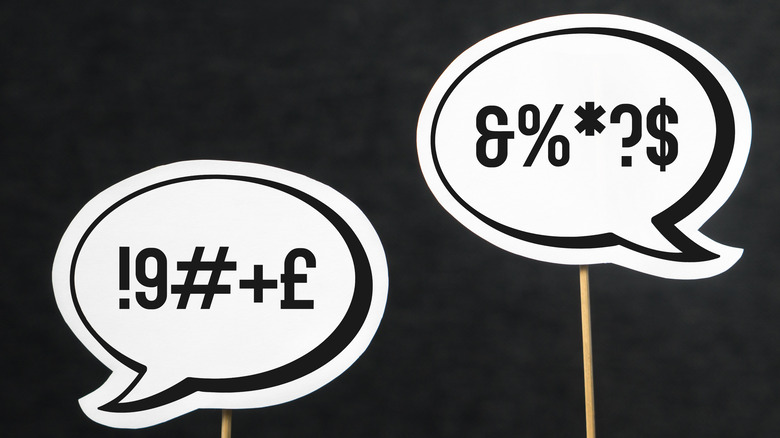Obscene Vs Profane Vs Vulgar: What's The Difference?
Disgusting! Revolting! Atrocious! Inconceivable!
We all have a threshold for what we consider uncouth and explicit, and there is a litany of dictionary terms we can use to express our discontent. People say things, art depicts things, and words reflect how we feel about it all, but semantics speak for themselves. Have you ever wondered what it really means to call something profane, obscene, or vulgar? All three carry a sort of daunting momentum, suggesting that you've done or said something really bad if the words are leveled against you, but what's the difference? Are they direct synonyms of one another, or are the nuances worth noting?
Merriam-Webster defines obscene as being abhorrent to morality or virtue/containing or being language regarded as taboo in polite usage. Profane is denoted as being abusive, irreverent, or contemptuous toward something sacred. Vulgar — last but not least — means lacking in cultivation, perception, or taste. The terms seem hardly distinguishable at face value, but let's unpack things a little further.
The explicit difference
If something is considered obscene, odds are the law will be involved in some way or another. Obscenity is actually used as a legal term that refers to expressions (words, images or actions) that offend the sexual morality of a given time and place and are not protected by the First Amendment (via Mental Floss). Often considered the most disgusting and "obscene" film of all time, Pier Paolo Pasolini's "Salò, or the 120 Days of Sodom" has endured a long list of obscenity charges since its release in 1975, one of which arose in Ohio in 1994 (per Baltimore Sun). In 1964, Supreme Court Justice Potter Stewart famously characterized pornography with the words "I know it when I see it" (per The Wall Street Journal).
"Profane" originates from the Latin term "profanes," which means "outside the temple." In that regard, the term is generally more geared toward its effect on religious sects and any "blasphemous" connotations that could accompany certain words and images. In a broader sense, it can be applied to instances of racism, sexism, and other morally-based insubordinations in civil society (via Mental Floss).
Vulgarity, for all intents and purposes, falls within a lower rung of notoriety. Also derived from a Latin term — "vulgis," meaning "the common people" — it generally refers to everyday curse words or crude language that perhaps your mother tried — and probably failed — to wash out of your mouth with a bar of soap when you were a child (per Mental Floss). Odds are you won't wind up in front of a judge for being vulgar, but you might find yourself in time out if your mom overhears you.

